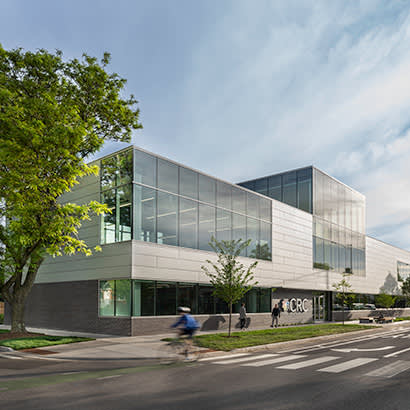
For an enhanced digital experience, read this story in the ezine.
Photo courtesy of James Steinkamp. Click here to view more images.
It’s an important time for community recreation centers around the country. As advances in technology and the coronavirus (COVID-19) pandemic have made communities more isolated and disengaged, our civic and community spaces need to be redefined to address the health and well-being of our communities. The role of community centers now stretches beyond their impact on an individual’s quality of life to include their impact on the sustained health of our communities and our cultures.
The Community Recreation Center (CRC), which opened in Oak Park, Illinois, in spring 2023, is a 42,000-square-foot facility designed and built during the pandemic and responds to our new needs around these facility types. Design started in March 2020 during the week Oak Park’s shelter-in-place orders took effect. Design and construction continued through a period of significant civil tensions, reinforcing the client’s and team’s belief in the importance of these projects in urban communities — bringing people together for collective physical, mental and community wellness.
Community engagement was central to the design process, and the pandemic required the project team to pivot to virtual meetings. Interactive polling and questions from the audience informed the design. Free after-school programs for students, new offices for the Community Mental Health Board and an esports lounge are among the more distinctive programs in the building. This broad mix of programming creates a welcoming space for all, not just athletes. The facility offers a range of amenities, including a fitness center, indoor gym, walking/jogging track with views of Chicago’s skyline, community meeting rooms and more.
The design expresses much of its programming along the active street to the north, encouraging membership and inclusion while taking advantage of the indirect light. A grand staircase in the center of the lobby takes visitors to the second level, consisting of the fitness center and a gymnasium with basketball courts. A bridge across the lobby atrium connects users to a multipurpose fitness studio and the Community Mental Health Board’s office suite. Informal gathering spaces with benches and tables for guests to meet, rest or work are available throughout the facility.
Support for Sustainable, Inclusive Design
Embracing the park district’s equity and inclusion mission, the inclusive bathrooms and locker rooms prioritize the privacy and comfort of users while providing shower, change and toilet facilities that are not gender specific. During interactive engagement, the community responded 89 percent in support of the inclusive facilities.
The CRC’s deep ties to its community are demonstrated further by a mural outside the center from local first-through-sixth graders depicting the stories of Oak Park’s geography, history and people from prehistoric times to the present.
The Park District of Oak Park managed to fund a majority of the project through donations and grants. The Illinois Clean Energy Community Foundation provided a grant for 80 percent of the improvements that helped the building achieve its net-zero energy goal. Arrays of photovoltaic (solar) panels on the roof, south façade and a canopy on the adjacent parking lot generate enough energy to exceed demands of the building, pushing electricity back to the grid — and, it is estimated, saving the park district $80,000 per year in energy costs.
Our communities are engaged now more than ever, with growing awareness of the vitality of community centers. The design of the CRC was an opportunity to fulfill the park district’s mission and the needs of its residents. The future of our community centers is one where designers and community leaders collaborate to understand how these facilities can be a focal point for inclusion and sustainability.
Brent Ross is a Practice Leader at Perkins&Will, specializing in the sports, recreation and entertainment market.

